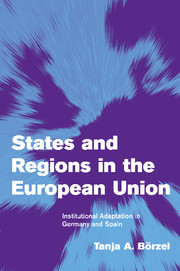Book contents
- Frontmatter
- Contents
- List of figures
- List of tables
- Acknowledgements
- List of abbreviations
- Introduction
- Part I Europeanization and domestic institutional change: A historical institutionalist approach
- Part II Reinforcing cooperative federalism: Institutional adaptation to Europeanization in Germany
- Part III Transforming competitive regionalism: Institutional adaptation to Europeanization in Spain
- Part IV Sharing versus shifting the costs of adaptation: The Europeanization of environmental policy-making in Germany and Spain
- Conclusions: Toward convergence in Europe?
- Appendix: The major EU environmental policies of the policy study
- List of references
- Index
Appendix: The major EU environmental policies of the policy study
Published online by Cambridge University Press: 22 September 2009
- Frontmatter
- Contents
- List of figures
- List of tables
- Acknowledgements
- List of abbreviations
- Introduction
- Part I Europeanization and domestic institutional change: A historical institutionalist approach
- Part II Reinforcing cooperative federalism: Institutional adaptation to Europeanization in Germany
- Part III Transforming competitive regionalism: Institutional adaptation to Europeanization in Spain
- Part IV Sharing versus shifting the costs of adaptation: The Europeanization of environmental policy-making in Germany and Spain
- Conclusions: Toward convergence in Europe?
- Appendix: The major EU environmental policies of the policy study
- List of references
- Index
Summary
The directive on the quality of water on human consumption (drinking water directive) (80/778/EEC)
The Directive on the Quality of Water on Human Consumption (Drinking Water Directive), adopted by the Council on 15 July 1980, is one out of three Directives that regulate water for human consumption. The Drinking Water Directive applies to all water that is required for direct human consumption (drinking water) and for food production. It imposes legally binding, substantive standards to reach a certain level of drinking water quality. The member states must fix values for each of the parameters indicated in the Directive, within the scope set by the guiding and mandatory values. The Directive also prescribes how often and by what means authorities have to monitor the water quality and it specifies a method of analysis for each parameter.
The directive on the combating of air pollution from industrial plant (84/360/EEC) and the directive on the limitation of emissions of certain pollutants into the air from large combustion plants (88/609/EEC)
There are two Directives which are of particular importance for the EU policy on the combating of air pollution: the Directive on the Limitation of Emissions of Certain Pollutants into the Air from Large Combustion Plants and its “mother directive”, the Directive on the Combating of Air Pollution from Industrial Plants.
The Industrial Plant Directive, which the Council adopted on 28 June 1984, provides framework legislation for preventing and reducing air pollution caused by industrial plants.
- Type
- Chapter
- Information
- States and Regions in the European UnionInstitutional Adaptation in Germany and Spain, pp. 234 - 239Publisher: Cambridge University PressPrint publication year: 2001



